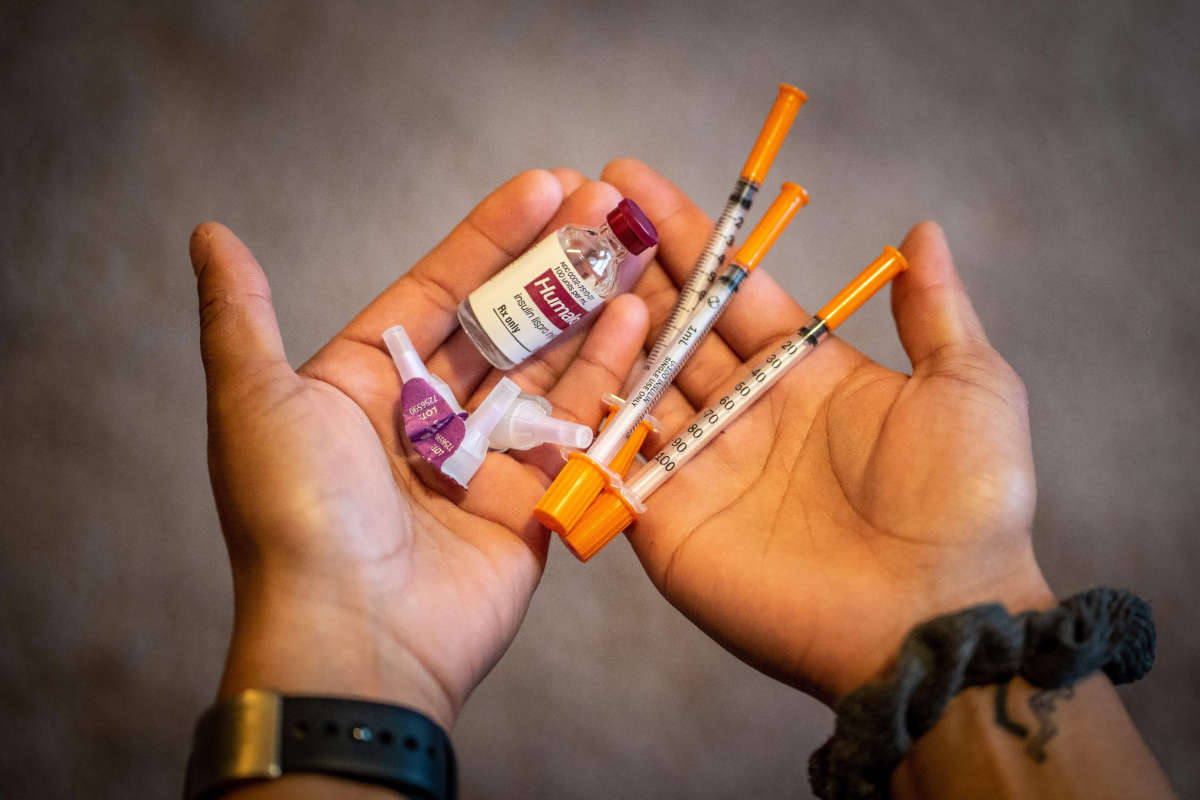New research unveiled Monday estimates that around 1.3 million U.S. adults with diabetes either skipped entire insulin doses, took less than needed, or put off purchases of the medicine over the past year due to its high cost, a striking indictment of a healthcare system that allows profit-seeking pharmaceutical companies to drive up prices at will.
The authors of the new study, published in the Annals of Internal Medicine, analyzed data from the 2021 National Health Interview Survey, examining a sample representative of 1.4 million U.S. adults with type 1 diabetes and 5.8 million with type 2 diabetes.
The results indicate that 16.5% of all adult insulin users across the U.S. rationed insulin in some way in the past year, with rationing more common among those with type 1 diabetes than type 2.
“Universal access to insulin, without cost barriers, is urgently needed,” Adam Gaffney, an ICU doctor at the Cambridge Health Alliance and the lead author of the study, told NBC News. “We have allowed pharmaceutical companies to set the agenda, and that is coming at the cost to our patients.”
Gaffney, an outspoken advocate of Medicare for All, said he has personally “cared for patients who have life-threatening complications of diabetes because they couldn’t afford this life-saving drug.”
BREAKING: We found 1,300,000 Americans with diabetes ration insulin due to cost.
Those without insurance had the highest rates of rationing at 30%.
This isn’t some awful phenomenon. This is a policy failure.https://t.co/SG5ntSDApe
— Public Citizen (@Public_Citizen) October 17, 2022
The high price of insulin has long been a scandal in the U.S., where the list costs of the cheap-to-produce medicine are often up to 10 times higher than in other countries.
Sen. Bernie Sanders (I-Vt.) has famously led caravans of people with diabetes into neighboring Canada to spotlight the shocking price of insulin in the U.S., which does little to regulate the pharmaceutical industry’s price-setting power.
One recent report by Human Rights Watch (HRW) described insulin access in the U.S. as “a privilege that many cannot afford,” noting that “soaring medicine prices and inadequate health insurance coverage can result in unaffordable out-of-pocket costs that undermine the right to health, drive people into financial distress and debt, and disproportionately impact people who are socially and economically marginalized, reinforcing existing forms of structural discrimination.”
The new study, co-authored by David Himmelstein and Steffie Woolhandler, echoed those findings, pointing out that people without health insurance “had the highest rate of rationing… followed by those with private insurance.” People on Medicaid and Medicare reported the lowest rate of insulin rationing.
“Several factors likely underlie our findings,” the authors note. “Insulin prices in the United States are far higher than in other nations. Moreover, pharmaceutical firms have increased insulin prices year upon year, even for products that remain unchanged.”
According to public data spotlighted by HRW, Eli Lilly has hiked the list price of the commonly used insulin product Humalog by an inflation-adjusted 680% since it started selling the drug in 1996.
Gaffney, Himmelstein, and Woolhandler note that the recently enacted Inflation Reduction Act includes a provision limiting insulin copays to $35 per month for those on Medicare, a change that “may improve insulin access for seniors, who experienced substantial rationing in our study.”
But they lament that Senate Republicans stripped out an insulin copay cap for those with private insurance.
“Further reform,” the trio writes, “could improve access to insulin for all Americans.”
In July, California Gov. Gavin Newsom announced that the state would soon move to produce its own insulin in an effort to provide a lower-cost alternative to Big Pharma’s products.
At the national level, HRW has called on Congress to “consider legislation to provide insulin to all insulin-dependent individuals in the country free-of-cost.”
“People who need insulin shouldn’t have to break the bank just to survive,” said Matt McConnell, economic justice and rights researcher at HRW, “but in the U.S. they often do.”
Our most important fundraising appeal of the year
December is the most critical time of year for Truthout, because our nonprofit news is funded almost entirely by individual donations from readers like you. So before you navigate away, we ask that you take just a second to support Truthout with a tax-deductible donation.
This year is a little different. We are up against a far-reaching, wide-scale attack on press freedom coming from the Trump administration. 2025 was a year of frightening censorship, news industry corporate consolidation, and worsening financial conditions for progressive nonprofits across the board.
We can only resist Trump’s agenda by cultivating a strong base of support. The right-wing mediasphere is funded comfortably by billionaire owners and venture capitalist philanthropists. At Truthout, we have you.
We’ve set an ambitious target for our year-end campaign — a goal of $250,000 to keep up our fight against authoritarianism in 2026. Please take a meaningful action in this fight: make a one-time or monthly donation to Truthout before December 31. If you have the means, please dig deep.
